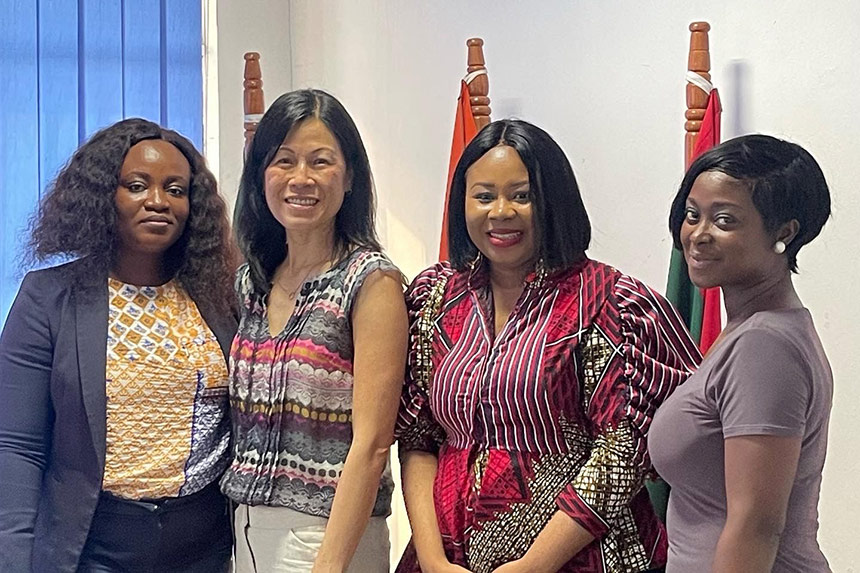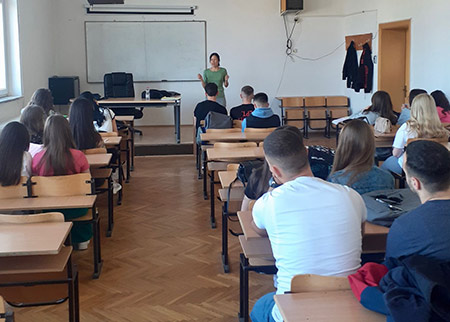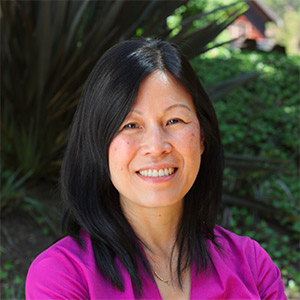
By Gwyneth K. Shaw
Linda Tam ’00 has stayed close with Berkeley Law for much of her career — working for more than a decade at the East Bay Community Law Center (EBCLC), then joining the First Year Skills Program faculty as a legal writing professor in 2021. So it’s fitting that her most recent professional adventure was sparked by fellow alums.
Over lunch, former EBCLC colleague Gail Silverstein ’99 suggested Tam meet Jessica Vapnek ’91, faculty director of the International Development Law Center at UC College of the Law, San Francisco (UC Law SF). Silverstein had traveled to Kosovo through the center and knew Tam had gone to Myanmar in 2015 to help develop experiential law programs there.
The center had also just received a $200,000 grant from the U.S. Embassy in Ghana for a 15-month project to build an exchange between the University of Professional Studies, Accra (UPSA) in Ghana and UC Law SF.
“It was a nice connection. We talked and it seemed like a great fit,” Tam says. “When these opportunities came up, I jumped on them.”
In February, Tam spent a week training UPSA’s law faculty about experiential legal education, particularly in the clinical realm, and supporting their development of similar programs. She also taught the fundamentals of the U.S. legal system and legal reasoning in three first-year survey classes, and attended a human rights symposium focusing on pending anti-LGBTQ legislation in Ghana.
Tam then traveled to Kosovo in May to do similar work at the University of Pristina, this time through another UC Law SF grant funded by the U.S. State Department Bureau of International Narcotics and Law Enforcement Affairs.
Full circle
She found the experience gratifying and exciting — a chance to shift back a bit to her roots doing clinical work while also absorbing the distinctions in different systems of law.

“Each university has its own challenges and is in a different place in developing its clinical education programs,” Tam says, noting that as in many countries, law studies in Ghana and Kosovo are done at the undergraduate level. “In these places, you choose your career much earlier than in the U.S. That poses different issues too.”
Amid efforts to strengthen legal systems around the world, law schools are a key pillar. Just as in the U.S., schools are trying to make the legal education system both more interesting to students and more geared toward preparing them to practice. Law schools are the perfect place for pragmatic experiential training, Tam says.
“Experiential education is the best way to build ethical, reflective lawyers who are thoughtful about how laws and policies impact actual people,” she says. “Things can sound very good on paper, but when students can actually see what problems they’re causing on the ground, that can really shift how they look at laws and practice as a lawyer.”
Tam was particularly impressed with the faculty at both schools, whom she called growth minded and incredibly knowledgeable.
“They bring a wealth of international knowledge and expertise to their jobs,” she says. “That was the most exciting and interesting part — meeting all the different professors, sharing our perspectives as legal educators, and learning about their legal system and legal education system.”
Reciprocal perks
Tam sees a great benefit in the connections being forged through her participation, both between UC Law SF and its partner schools and between Berkeley Law and its cousin across the San Francisco Bay.
“I’m really looking forward to building on that,” she says.
Vapnek says it’s a happy coincidence that she, Tam, and Silverstein all sprang from Berkeley Law and are equally passionate about international work.

“I was fortunate to be introduced to Linda by Gail, who told me that Linda had great overseas experience, which served her well representing UC Law SF and our International Development Law Center recently in both Kosovo and Ghana,” Vapnek says. “She brings a thoughtful and nuanced cultural understanding and really connected with our counterparts at the University of Pristina Law School and the University of Professional Studies, Accra.”
Tam hopes to continue her work with the programs. Shifting her career focus into teaching legal writing meant departing from her clinical background. These international events help create a through line in her career, Tam says, and she’s already looking forward to the next opportunity.
“I feel like I’m putting all the pieces together, and realizing that these different things I’ve done across my career are actually very interrelated,” she says. “Realizing this has been super important for me. Being able to step away from what I do at work on a daily basis gives me a different perspective when I come back to it.
“You can see more clearly the strengths and weaknesses of our own legal system and legal education system, comparatively. It really is an opportunity for mutual learning.”